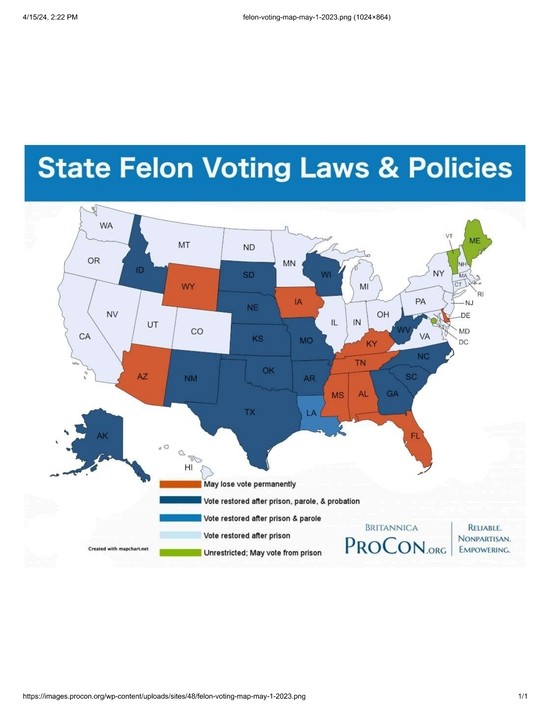In a genuine democracy, a citizen’s right to vote regardless of their socio-economic circumstances shouldn’t be infringed upon. Not so in America as the map below indicates. In many states, citizens convicted of felonies must undergo labyrinth, onerous, or time-consuming processes to restore their right to vote. According to The Sentencing Project, a criminal justice think-tank, approximately 4.6m Americans were barred from voting in 2022 because of criminal convictions, disproportionately affecting people of color or the poor. In effect, the US criminal justice has been cynically used as a weapon to disenfranchise voters since the Jim Crow era.

And some states stand out for their medieval application of voter suppression. Tennessee excludes 470,000 citizens from voting (nearly 10% of their population). Although a 2021 gubernatorial order by a Democratic governor restored the rights of 69,000 felons in Virginia, its constitution specifically excludes those with felony convictions from voting. In Florida, felons who committed homicide or sexual crimes may be permanently disenfranchised (or those who simply can’t pay their court fines).
Two states can enforce lifetime voter disenfranchisement for certain felonies: Delaware for bribery, sexual offenses, or murder; Alabama, for the ambiguous and subjective “crimes of moral turpitude.” Readers are encouraged to read the specific prohibitions for their state in the link at bottom.
Meanwhile America’s neighbor to the north ensures that each citizen in every province, regardless of their race, socio-economic situation*, or criminal offense remains enfranchised.
“All Canadians incarcerated in provincial, territorial, or federal institutions have the right to vote. In 2017-2018, there were 38,786 adults in federal or provincial/territorial custody.”
An international comparison of voter suppression may be examined here: felonvoting.procon.org/…
Every draconian law enacted gives the police an opportunity to potentially disenfranchise a voter in many parts of America, to wit: women seeking reproductive care in Texas, citizens filming police abuse in Florida, union organizers protesting unjust labor practices in Kansas, or environmentalists demonstrating against the construction of hazardous oil pipelines in South Dakota.
To combat voter suppression, every Democratic governor and President Biden must sapiently grant as many executive pardons as feasibly possible.
*Footnote: Homeless people in Canada have the right to vote. If an undomiciled Canadian has any identification (provincial health insurance card or driver’s license), they may vote in the riding where they are sheltering.
Sources:
projects.fivethirtyeight.com/…
This post was originally published on this site be sure to check out more of their content.






